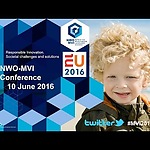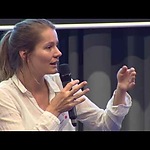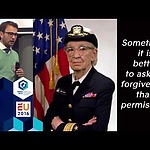Original source: http://www.nwo.nl/en/research-and-results/programmes/responsible+innovation/meetings/nwo-mvi+conference+2016
Responsible Innovation. Societal challenges and solutions
On 10 June, the NWO-MVI research programme organised a special EU presidency 2016 edition of its annual conference at the Amsterdam Science Park Congress Centre. The conference focused on concrete tools for applying responsible innovation and was aimed at researchers, entrepreneurs, policy makers and representatives from NGOs. Participants shared experiences and best practices. Researchers highlighted examples of current research projects within the NWO-MVI programme, which is aligned to all top sectors and the Dutch National Research Agenda.
Platform for Responsible Innovation

How does society benefit from responsible innovation? What lessons have been learned? How can companies implement these in practice and get a greater licence to operate? The new NWO-MVI Platform, which was pre-launched at the start of the NWO-MVI conference, will provide information, inspiration and contacts for researchers, companies, government bodies and societal organisations. The aim of the platform will be to further consolidate and expand the knowledge and community developed within the programme.
Responsible Innovation | Flyer Platform for Responsible Innovation PDF, 462 KB
Keynote Dirk Helbing
Professor Dirk Helbing, EHT Zurich and Delft University of Technology, held a keynote speech on the ethical and social dilemmas of Big Data for Smart Cities. His claim: our data-driven society is at a crossroads. Regulation, optimisation and globalisation are reaching a limit, and we need to combine perspectives: co-creation, coevolution, collective intelligence and man-machine symbiosis. He called for a new digital approach, compatible with self-determination, democracy, and free entrepreneurship: distributed data, storage and control:
Added value of responsible innovation in different fields
Three NWO-MVI project leaders discussed the added value of responsible innovation in relation to different research themes. Their cases showed how the NWO-MVI approach is applied to the economic priority areas of the various Dutch top sectors. Showcases focused on the fields of energy, health care and health care technology.
Eline Bunnik (Erasmus MC) presented her research project on early access to experimental drugs:
Showcase
Peter-Paul Verbeek (University of Twente) and Nico Nijenhuis (CEO Clear Flight Solutions) presented their NWO-MVI showcase on responsible design of drones and drone services:
Parallel sessions
Professor Harro van Lente (Maastricht University) exemplified how a 'societal incubator' could work in his session The Societal Incubator as a Solution to Waiting Games in Emerging Technologies. In the interactive session a restricted number of participants performed a role play around a possible development of nanotechnology in food. Groups of participants were allocated a role and were asked to find and voice their position: a food producer, a ministry of regulation, a research group of nanotechnology. In the first rounds the groups were not allowed to discuss the matter and to make agreements. What emerged was a 'waiting game': a situation in which groups decided to wait for what others would do. When they were asked to seriously question each other's ambitions and concerns they started to align their strategies.

Andreas Felscher, Doris Schroeder, Thomas Frenken
Professor Doris Schroeder (University of Central Lancashire), Thomas Frenken (oldntec) and Andreas Felscher (humanitarian organisation ‘Die Johanniter’) introduced a product (the ambiAct) that achieved high acceptability and fast market entry through extensive engagement and collaboration across stakeholders. As a journalist summarised after the session: 'a textbook example of RRI'.
The parallel session about RRI on a European level focused on three RRI projects:
- 1 completed project: Responsible Research and Innovation in a Distributed Anticipatory Governance Frame: designing a governance framework for RRI, (Bart Walhout, University of Twente)
- 1 current project: Tools or concrete instruments enabling stakeholders to put RRI in practice, (Jacqueline Broerse and Frank Kupper, VU University Amsterdam)
- 1 starting project RRI Practice: analysing RRI related discourses and pathways to implementation, (Hub Zwart en Luca Consoli, Radboud University).
The lively discussion during this session centred around three questions raised by the project leaders: How to deal with diversity of views on RRI? How to move from theory to practice? What are the challenges/pitfalls for upscaling?



